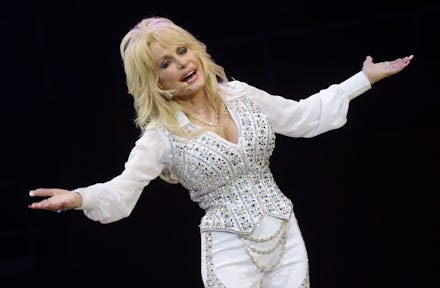Dolly Parton's 'Pure and Simple' paints a picture of love that's just that

When Beyoncé's Lemonade burst onto the scene earlier this year, America was electrified by the powerful — if calculated — glimpse it provided into the conflict possibly endured by America's demigod couple.
Four months later, Dolly Parton's new album, Pure and Simple, accomplishes something similar, the key difference being that the story it tells is a far tamer glimpse into the bucolic 50-year marriage between a musical megalith and a man who's somehow managed to stay completely out of the spotlight.
The level of discretion Parton and her husband, Carl Dean, have maintained is something that's all but unheard of in today's celebrity climate. It seems almost wasteful in terms of publicity opportunities, yet a Google image search of "Dolly Parton husband" yields as many pictures of her without him as it does with. Parton has been so hushed about her marriage it's hard to consider alongside the year-in, year-out pizazz of her art. Until now, that is.
The stories she tells on Pure and Simple add up one of Parton's least schmaltzy, most personal releases in memory. It will undoubtedly get far less attention than Lemonade, but it's certainly worth a gander for any fan of the storied Backwoods Barbie.
Pure and Simple is a breezy, 10-track, half-hour ode to love that executes the promise of its name with great thrift.
The economy here is two-fold: all tracks are scaled-back in both accompaniment and narrative. Though the artist herself describes the record as encompassing "every kind of love there ever was," upon listening, it's hard to hear anything but a celebration of an enduring romance's power to continually excite and nourish its constituents.
Whether it be the beginning ("Outside Your Door"), the enduring ("Pure and Simple", "Never Not Love You"), or the eternal ("Tomorrow Is Forever"), Pure and Simple provides a prismatic look at a romance with sentiments that ultimately feel like they could come from the same, long song.
A narrative outlier is found in "Can't Be that Wrong," a slow ditty whose ruminations ping-pong between infidelity and God. As always, Dolly sells it, slyly masking seriously grim theological implications with her pleasant trill. "To hell with heaven if it means I'll lose you," she sings.
The album's sparse instrumentation bears some likeness to her fabulous renditions of folk ballads from years past — but the comparison ends there. Gone are the grim gender politics of old staples like "Silver Dagger," with nary a lovesick, suicidal leap from a bridge to be found. Keep in mind: this is the woman who once sold what can be read as a retelling of Hansel & Gretel from the witch's perspective — to cheers and applause. However, on this album there's none of this cheeky fantasy — and that's simply the point.
It's important to note that Pure and Simple, including its namesake song, was produced to round out a large tour of similarly scaled-back performances, inspired by well-received shows in Nashville and at Dollywood. Hers is a pop machine that is both efficient and, improbably, fabulously, authentic.
Dolly's glam has always been a vessel for her outsized talent, and 70 years into her life and 43 albums in, none of this has changed. Regarding her countenance, Parton has famously stated that if she sees something "sagging, bagging, and dragging," she'll happily "nip it, tuck it, and suck it." Based on her slim new installment, it's clear her love for Carl Dean is in need of no such adjustment.